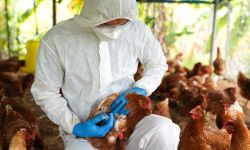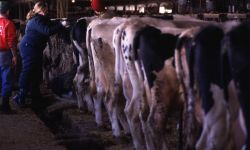Opinion | To stop bird flu, Michigan must protect farmworkers
Experts are sounding the alarm: Michigan is “ground zero” for the bird flu crisis in the United States. H5N1, as the strain is officially known, is a highly contagious form of avian influenza that has been spreading in chickens and turkeys for years and recently made the jump to cows and other mammals –– including humans.
In early June, Michigan Public reported that farmworkers in Michigan are increasingly exposed to H5N1 bird flu, including a new strain causing respiratory symptoms. This means the virus may begin spreading from person to person through coughs or sneezes.

And policies that leave farmworkers behind are putting Michiganders –– and the whole country –– at risk.
There is evidence that bird flu is already spreading from person to person. A patient in Mexico City, who had not been in direct contact with farm animals, recently died after contracting bird flu while hospitalized for other conditions. Though health authorities believe he died from co-morbidities, his death suggests that, like COVID-19, bird flu may be spreading in the general population and that people with chronic health problems may be at increased risk for death.
In light of this news, Michigan should protect farmworkers in order to prevent a wider bird flu outbreak. We can do this by using the proven strategies of providing testing, personal protective equipment (PPE), medical care, and paid sick leave to workers who handle livestock and poultry.
Farmworkers are on the frontlines of the bird flu outbreak. Protecting farmworkers would limit the initial point of contact and transmissibility. It isn’t just the right thing to do; it’s a smart strategy to prevent another pandemic.
Though state and federal law require farm owners to provide PPE — like masks, gloves, face shields, and goggles — farmworkers across the state have told advocacy groups that they’re not receiving any. Recognizing the danger that lack of PPE poses, groups like the United Farm Workers Foundation have urged the Michigan Farm Bureau to take the issue seriously.
While viruses don’t discriminate, our responses to viral outbreaks certainly can, and neglecting farmworkers now will only serve to exacerbate disease spread.
Michigan has been praised for monitoring the spread of bird flu and for texting and calling farmworkers in affected counties to encourage them to monitor for flu-like symptoms. The Michigan Department of Agriculture and Rural Development also issued a statement that they are offering assistance to dairy farms in need of protective equipment, but they failed to explain how farms can get assistance or what workers should do if they’re working on a farm that isn’t providing PPE. Most importantly, these efforts fail to address the broader concerns that make farmworkers medically vulnerable.
Migrant farmworkers and undocumented immigrants — who are overrepresented in the agricultural sector — rarely have access to stable health care or paid sick leave. They often live in cramped housing, making it hard to isolate if they’re sick. Those who live on the farms where they work often lack transportation. And because they fear job loss and retaliation that could result in deportation, they may be reluctant to report bird flu symptoms or avoid getting medical care, even when it’s desperately needed.
Though Michigan is missing the mark on bird flu, it’s not too late to change course. We can take lessons from the COVID-19 pandemic.
In 2020, politicians and pundits extolled “essential workers.” Estimates suggest that more than two-thirds of all undocumented immigrants worked in essential jobs during the pandemic.
But while the rhetoric was uplifting, public health experts cautioned that essential workers were more likely to contract COVID, spread the virus to others, and to die themselves. These predictions, sadly, came true.
We have a chance to do things differently now. In the face of this new virus, the sooner we act to protect vulnerable agricultural workers, the safer and healthier we all will be. Michigan’s leaders should waste no more time and act now to protect farmworkers, and all of us, from this new threat.
See what new members are saying about why they donated to Bridge Michigan:
- “In order for this information to be accurate and unbiased it must be underwritten by its readers, not by special interests.” - Larry S.
- “Not many other media sources report on the topics Bridge does.” - Susan B.
- “Your journalism is outstanding and rare these days.” - Mark S.
If you want to ensure the future of nonpartisan, nonprofit Michigan journalism, please become a member today. You, too, will be asked why you donated and maybe we'll feature your quote next time!




